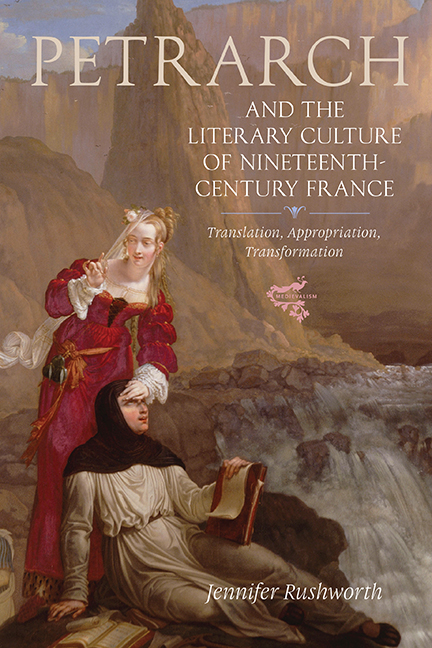 Petrarch and the Literary Culture of Nineteenth-Century France
Petrarch and the Literary Culture of Nineteenth-Century France Book contents
- Frontmatter
- Dedication
- Contents
- Acknowledgements
- Note on English Translations
- Introduction: Local History, Local Stories
- I Translations
- II Rewritings
- 5 Petrarch in Poetry
- 6 The Novelization of Petrarch
- Conclusion: Petrarch and Patriotism
- Appendix 1 A Chronological Survey of Translations of Petrarch's Italian Poetry (the Canzoniere and Triumphi) between 1764 and 1903 in France
- Appendix 2 Translations of the Opening Stanza of RVF 126 from Voltaire (1756) to Brisset (1903)
- Bibliography
- Index
- Miscellaneous Endmatter
6 - The Novelization of Petrarch
from II - Rewritings
Published online by Cambridge University Press: 09 May 2017
- Frontmatter
- Dedication
- Contents
- Acknowledgements
- Note on English Translations
- Introduction: Local History, Local Stories
- I Translations
- II Rewritings
- 5 Petrarch in Poetry
- 6 The Novelization of Petrarch
- Conclusion: Petrarch and Patriotism
- Appendix 1 A Chronological Survey of Translations of Petrarch's Italian Poetry (the Canzoniere and Triumphi) between 1764 and 1903 in France
- Appendix 2 Translations of the Opening Stanza of RVF 126 from Voltaire (1756) to Brisset (1903)
- Bibliography
- Index
- Miscellaneous Endmatter
Summary
THIS CHAPTER DRAWS on and develops the discovery, in the Introduction, of prose texts that tell stories about Petrarch's life, and in particular about Petrarch's love for a specific historical individual named Laura. While these texts were typically works of criticism, history, and biography, in this chapter the texts under discussion are, instead, novels. Here, the Petrarchan novel is considered to pursue to its logical limit the desire of both critics and certain translators to embed the Canzoniere into a prose narrative, that is, to a point where prose has all but pushed poetry out of the picture entirely. Petrarchan novels represent a surprising product of nineteenth-century French Petrarchism, in contrast to the formally contiguous influence of Petrarch on French poetry delineated in the previous chapter. The increasing popularity of the novel in nineteenth-century France, conjoined with Romantic medievalism, enables a true transformation of Petrarch from poetry to prose.
Reading Petrarch's Canzoniere explicitly as a novel perhaps begins with the German poet, critic, and philosopher Friedrich Schlegel, who asserted that ‘Petrarch's poems are classical fragments of a novel’. This comment adopts Petrarch as an avatar of the new (and admittedly ill-defined) genre of the novel, even as it acknowledges the discontinuous, fragmentary, and therefore rather un-novelistic form of Petrarch's aptly named Rerum vulgarium fragmenta. In the middle of the century, Ernest and Edmond Lafond reiterated and developed this statement, praising Petrarch's novelistic insight into human emotions: ‘His Canzoniere is the true source of the modern novel, which has taken as its aim the metaphysical analysis of love in its battle with duty.’ Such novelistic readings of Petrarch's poetry went hand-inhand with the sporadic transformation of Petrarch's story into material for a novel, a process to which a number of seminal French novels of the late eighteenth and the first half of the nineteenth centuries are, in various ways, committed. In 1902, Henri Hauvette exhorted readers of Petrarch to beware of ‘seeking in the Canzoniere what it does not contain, by which I mean analysis of the female heart or even a romantic novel [un roman d'amour]’. This warning, however, came far too late.
Theoretical Framework
Two theoretical models are at work in this chapter, stemming from Mikhail Bakhtin and Eve Duperray respectively.
- Type
- Chapter
- Information
- Petrarch and the Literary Culture of Nineteenth-Century FranceTranslation, Appropriation, Transformation, pp. 187 - 232Publisher: Boydell & BrewerPrint publication year: 2017


